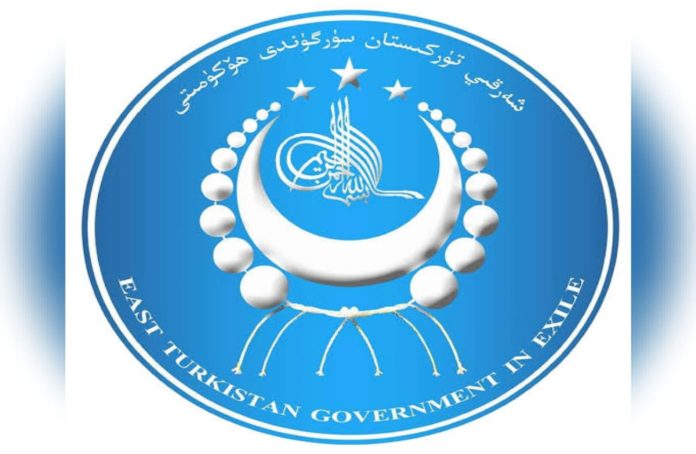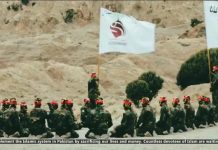(Column by Ghulam Osman, President of East Turkistan Government-in-Exile )
Uyghurs utilize an analogy to illustrate the true nature of Chinese: “Chinese are soft worms that eat hard wood.” This is not a joke, rather it depicts the bitter lessons Uyghurs have learned historically in their interactions with Chinese. For ages, Chinese have adopted two main methods of expansionism as their main political means to attain their strategic goals, both of which have been based on softness. The first is to disguise themselves as miserable, abused refugees or migrants, seeking humanitarian aid.
This is coupled with arranging marriages for Chinese girls with princesses of other nations, into whose territories China intends to expand.
In ancient times, Chinese offered their princesses as gifts to our ancestors, the ancient Turkish kingdoms living outside the Great Wall, when they felt they could not win a war against them. The purpose of this offer was to create mixed-blood princes who would influence the direction of their future foreign policies. Accompanying the princesses were spies, pretending to be relatives, servants, and assistants, hundreds of them, with the purpose of infiltrating our ancient Turkish kingdoms. They got married to locals after their settlement, playing an important role in facilitating internal coordination of the external invasion of Chinese kingdoms. During peaceful times, they took on spying roles clandestinely.
Appearing as refugees or migrants, starving and without clothing, escaping from disasters, is the most common expansion method of Chinese as a way of eliciting the sympathy of anyone who is kind-hearted. They would usually be provided with essentials and even spare rooms, unbeknown to the hosts, their guests’ hearts were filled with malevolent spirits—the ambition of occupation. The Manchus, who ruled the area that is modern day China, Korea, and Mongolia, lost their nation due to an influx of such refugees into their territory. Chinese are now expanding into the vast lands of Russia in the Far East, resulting in massive demographic changes.
The second method of Chinese expansionism is military invasion, pursued when considered they are strong enough to overpower the country they want to take over. However, this method is still based on soft forces, measures, and behaviours. They break local resistance through implementation of people-centric policies until their army has already occupied strategic points and locations. For example, in his reign of power in East Turkistan, Yaqub Beg prepared for a long-term war to push back the Chinese as he was worried about imminent Chinese colonialism.
According to historical sources, he sufficiently stored enough grain to last for thirty years, causing some social discontentment among locals. The army of Zuo Zongtang, who led the invasion of East Turkistan, deliberately opened granaries in occupied places to the public. This psychologically swayed the mindset of the public in not-yet-occupied places. The “kind” Chinese who distributed the grain stored by Yaqub Beg caused internal disunites from within his own army. After invading the far-away villages in Hotan, the invaders carried out genocide and forcefully took the grain back from the public in cruel ways.
After being sent on a mission to occupy East Turkistan under leadership of Wang Zhen, the People’s Liberation Army (PLA) forces spent months in Lanzhou attending courses on how to behave once they were stationed in East Turkistan.
They were also taught the diaries of Zuo Zongtang, whose colonial experiences were full of nationalistic chauvinism, being instructed that the local peoples in East Turkistan are not friends but potential enemies. Wang Zhen ordered soldiers to shoot five male local civilians without mercy for every PLA soldier killed in an attack in any neighbourhood, village, or town being occupied.
Congruently, soldiers carried buckets full of cow manure collected on the streets, and once it is filled up fully, they threw them into farm lands as fertilizer, while helping elders with farm work and bringing water to them, with an aim of gaining the trust of the locals by pretending to be helpers. They launched a series of propaganda campaigns that they did not come to what they call “Xinjiang” for occupation but for assistance, and they would help establish socialism there in 3-5 years. For this feigned goal, they repeatedly stressed they would eliminate resistance forces, establishing socialism and puppets of imperialism, leaving after this is accomplished successfully.
Under the cloak of misleading campaigns, military moves happened at night without stirring public attention. All great deeds to win the hearts and minds of locals were conducted, until Chinese soldiers occupied crucial strategic locations and set up necessary military equipment and logistical facilities in preparation for a long-term war. While making these crucial preparations, they eliminated those who would be local leaders through assassinations and purges.
Assassinations of famous local figures were blamed on local forces, groups, or individuals, who they intended to destroy through creating bogus criminal files. This enabled them to conveniently carry out many atrocities and political purges. People have a collective crowd psyche, tending to trust what is presented to them, not acknowledging the motives beneath the surface. We also know that to take notice of hidden truths behind appearances needs calculated action. Kind-hearted people do not question what is happening around and behind their back in detail, telling us convincingly how the colonization of East Turkistan happened.
The former Soviet Union sent Uyghur communists as part of Comintern on a mission to influence the attitudes of locals to align with itself. By doing so, it intended to bring East Turkistan into the orbit of the Union. The spies of Comintern conducted a series of covert espionage activities in East Turkistan for more than 20 years, including surveys conducted on local leading figures who preferred Chinese positively perceived as being soft, in comparison to the toughness of the Russians. While some Uyghur leaders started to regret their choices in the 1950s, it was too late to turn the tide.
After the invasion of East Turkistan, Chinese polices were unilaterally pursued in a non-comprising and strict manner with an understanding that leniency in one area would lead to leniency in another. Therefore, the Chinese considered being non-compromising and strict as the key to dampening the dream of freedom that the locals had. The extreme aspects of Chinese policies may have sometimes been halted but were never turned back. It is impossible to have human rights, autonomy, and cultural rights under strict Chinese rule. These rights and freedoms are only possible once Chinese rule completely ends.
The indoctrination of locals to not oppose Chinese colonialism was planned, and it was perfected and systematically carried out under the rule of the Chinese Communist Party. Consequently, locals were led to believe it is impossible to overturn Chinese rule and any attempt at doing so is futile, this sense of hopelessness was gradually and deeply implanted in their minds.
It must be mentioned that there is a difference between Chinese migrants and other non-Chinese migrants—Chinese migrants always have a political agenda and they never accept the values of the democratic country they migrated to. For example, many of the so-called Chinese democrats in the West never accept that East Turkistan was occupied by their ancestors. Even Chinese-born nationals in the West repeat the same old political lie that East Turkistan has been an inseparable part of China since antiquity. Nobel Peace Prize Winner Liu Xiaobo once famously stated, “China must be a colony of the West for three hundred years to understand democracy.” This is neither a joke nor sarcasm but the apt description of Chinese reality.
It is not too difficult to notice the malevolent interior motives of Chinese migrants as any of them has the potential for spying for their motherland, which is now a known fact being accepted by an increasing number of people around the world. Apart from this, I remember I read an article on a Chinese website, entitled “Canada will be ours in future.” This should not be taken lightly, for the article offered some arguments for how this goal will become a reality as follows—increasing number of Canadians, in particular white Canadians who are the majority, do not want to have children but every Chinese migrant family has at least four children. Which plays a role in the fact that Chinese people make up most of the minority population in Canada.
Thus, this increasing population can lead to the Chinese being the majority in Canada, surpassing even white Canadians. Considering this potential demographic change, Canada may become a Chinese nation in future in the strictest sense of the word. By virtue of these factors, we can understand the nature and methods of Chines the expansionism.
(East Turkistan is a province under occupation of China and comprises Uyghur Muslims who are fighting for liberation from Chinese rule.)








